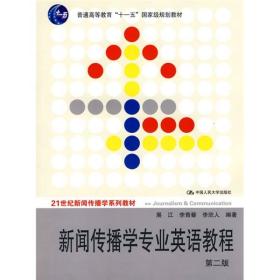
新闻传播学专业英语教程
¥ 22 5.6折 ¥ 39 全新
库存2件
河北保定
认证卖家担保交易快速发货售后保障
作者展江、李青藜、李欣人 著
出版社中国人民大学出版社
出版时间2010-03
版次2
装帧平装
货号9787300117560
上书时间2024-12-05
- 在售商品 暂无
- 平均发货时间 27小时
- 好评率 暂无
- 最新上架
商品详情
- 品相描述:全新
图书标准信息
- 作者 展江、李青藜、李欣人 著
- 出版社 中国人民大学出版社
- 出版时间 2010-03
- 版次 2
- ISBN 9787300117560
- 定价 39.00元
- 装帧 平装
- 开本 16开
- 纸张 胶版纸
- 页数 398页
- 字数 478千字
- 正文语种 简体中文, 英语
- 丛书 21世纪新闻传播学系列教材
- 【内容简介】
-
1.本书共分为18个单元,教学可按17~18个教学周、54学时安排。每单元由4篇选文构成(个别单元为5篇),每篇选文的长度在1000个单词左右。内容大致涵盖大众传播事业的主要部类和新闻与传播学的主要领域。
2.在每单元所选文章中,根据单元主题的不同,一般有1~2篇著名学者关于该主题的经典论述,1~2篇比较具体的个案研究性质的文章,以及1篇综合性的概述(反映本学科到20世纪末的发展)。这样组合的目的,是希望能尽量做到材料新颖,容量充足,内容权威,点面结合,深浅有致,形成梯次,适合新闻与传播学专业本科生和硕士研究生共同使用。
3.本书所选文章,主要来自新闻学、传播学、政治学、经济学、法学、文化学、社会学等方面的文献。
4.课文生词的选择和释义以教育部公布的《大学英语教学大纲通用词汇表》中的四级词汇为起点,学生可参考生词表来理解课文。
5.在课后练习中,练习一采取问答题的形式,旨在培养学生理解作者的主要观点,并归纳课文主要内容的能力。
6.专业翻译能力的培养是本教材的一个重要目的。在每单元所选文章中,我们提供两篇译文,作为教学参考。 - 【目录】
-
Unit 1 Introduction
Passage One The Meaning of \\\"Communication\\\"
Passage Two McQuails Normative Theories
Passage Three Hot and Cold
Passage Four Minervas Owi
Unit 2 Books
Passage One Books in History
Passage Two Book Publishing
Passage Three The Printing Press as an Agent of Change
Passage Four Areopagitica: A Speech for the Liberty of Unlicensed Printing
Unit 3 Magazines
Passage One Magazine as Media Innovators
Passage Two Magazines Push Images Over Words
Passage Three Luce and Time
Passage Four Early Periodical as Publicist Instrument of Criticism
Unit 4 Newspapers
Passage One What if There Were No Newspaper?
Passage Two A Newspaper Industry Casualty You May Have Missed
Passage Three The New York Times in 1990s
Passage Four Natural History of the Newspaper
Unit 5 Film
Passage One Importance of Movies
Passage Two The Structure of the Western Film
Passage Three Hollywoods Big Six
Passage Four Schindlers I.ist: The Role of Memory
Unit 6 Radio
Passage One FMs Rise
Passage Two Characteristics of American Radio
Passage Three Trends and Convergence in Radio and Sound Recording
Passage Four The Assets and Liabilities in Radio
Unit 7 TV
Passage One Impact of Television
Passage Two Culture
Passage Three The Case for Television Journalism
Passage Four CBS News
Unit 8 Internet and Media Convergence
Passage One Internet
Passage Two Worldwide Wedge: Division and Contradiction in the Global Information Infrastructure
Passage Three Weblogs, Citizen Journalists and Traditional Media
Passage Four Media Convergence and Complications
Unit 9 Media Education and Media Literacy
Passage One The Origin of Journalism Education
Passage Two What They Dont Teach at J-School
Passage Three Green-Eyeshades Versus the Chi-Squares
Passage Four Elements of Media Literacy
Unit 10 Advertising
Passage One Media Choices
Passage Two Origins of Advertising
Passage Three Advertising: The Magic System
Passage Four Advertising: Agencies and Copywriters
Unit 11 Public Relations
Passage One Defining Public Relations
Passage Two Public Relations Services
Passage Three Newsmaking
Passage Four The Roots of Public Relations
Unit 12 Media Economy
Passage One Economic Foundation of Mass Media
Passage Two The Two Economies
Passage Three Television Programming
Passage Four Rupert Murdoch
Unit 13 Culture Industry and Culture Studies
Passage One Culture Industry Reconsidered
Passage Two What Is British Cultural Studies?
Passage Three Properties of the New Media and a Socialist Strategy
Passage Four Hegemony: An Overview
Unit 14 Process of Mass Communication
Passage One Encoding/Decoding
Passage Two The Acts of Communication
Passage Three The Circuit and the Acts
Passage Four Selecting the News: Gatekeeping
Unit 15 Effects and Audience of Mass Communication
Passage One Effects Studies
Passage Two The Uses and Gratifications Model
Passage Three TV and Learning
Passage Four Scientific and Nonscientific Polls
Unit 16 Mass Communication and Society
Passage One Some Social Functions of the Mass Media
Passage Two The Masses: The Implosion of the Social in the Media
Passage Three The Debate over Civic Journalism
Passage Four Investigative Reporting
Unit 17 Mass Communication and Social Control
Passage One Government Manipulation of Media
Passage Two Of the Liberty of Thought and Discussion
Passage Three The Principles
Passage Four Jeffersons View of the Press
Unit 18 Laws and Ethics of Mass Communication
Passage One The First Amendment to the Constitution
Passage Two The Means to the End
Passage Three Should the Names of Rape Victims Be Published?
Passage Four Attributing a Libel Is No Defense
Appendix A Key to Exercises
Appendix B Chinese Translations
参考文献
点击展开
点击收起
相关推荐
— 没有更多了 —


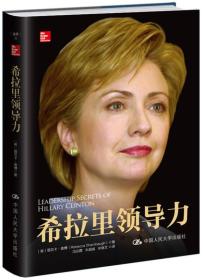


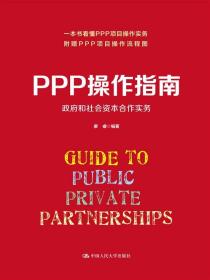




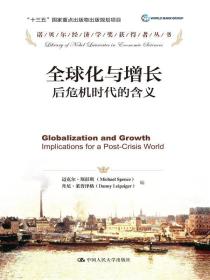





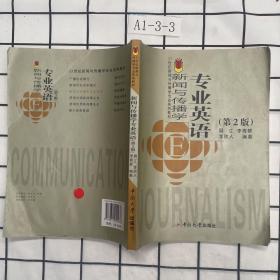
以下为对购买帮助不大的评价